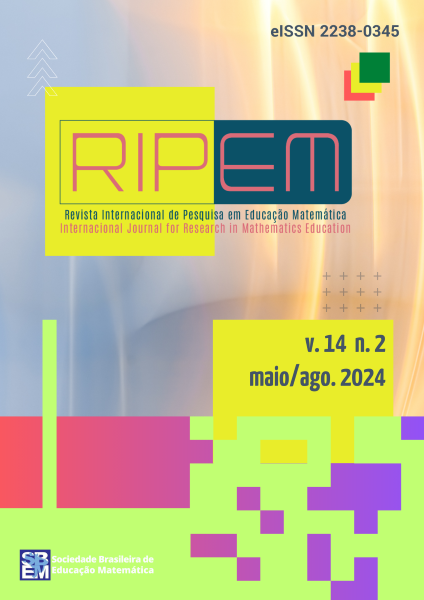Resources of curriculum materials that induce teachers' professional knowledge of the additive conceptual field
DOI:
https://doi.org/10.37001/ripem.v14i2.3742Palavras-chave:
Curriculum Materials, Additive Field, Professional Teaching KnowledgeResumo
Assuming that curriculum materials reverberate the knowledge of teachers, we sought to identify and discuss features of the materials, related to the additive field, which induce professional knowledge in Mathematics. Through a documentary analysis of three 2nd, 3rd and 4th grade Mathematics Teacher's Manuals, the addition and subtraction problems were mapped and analyzed; the texts presenting the material and the units corresponding to the mapped problems were analyzed, as well as the specific guidelines for working with these problems. Considering the Conceptual Fields Theory and the Knowledge of Knowledge of Curriculum Embedded Mathematics as references, we identified a variety of problem classes, as well as guidelines on the different meanings of operations. We observed weaknesses in the approach taken in the 2nd grade Manual corresponding to the addition and subtraction approach, to the detriment of the other Manuals. We noted the absence of explicitly stated information in the three manuals, which may have an impact on the way teachers read and interpret the guidelines, and evaluate the problems, implying the teaching knowledge mobilized or constructed.
Downloads
Referências
Antunes, F. M. (2022) Avaliação de materiais curriculares por professores que ensinam Matemática em escolas da Educação do Campo. 101f. Dissertação (Mestrado em Educação). Universidade Estadual de Montes Claros. Montes Claros, MG.
Ball, D. L.; Hill, H. C. & Bass, H. (2005). Knowing Mathematics for teaching: who knows mathematics well enough to teach third grand, and how can we decide? American Educator, 29(3), 14-17, 20-22, 43-46.
Ball, D.; Thames, M. H. & Phelps, G. (2008). Content knowledge for teaching: what makes it special? Journal of Teacher Education, 59(5), 389-407.
Brasil. Ministério da Educação. Secretaria de Educação Básica. (2017). Base Nacional Comum Curricular: Educação Infantil e Ensino Fundamental. Brasília, DF: MEC/SEB.
Brown, M. W. (2009). The Teacher-Tool Relationship: theorizing the design and use of curriculum materials. In: J. T. Remillard; B. A. Herbel-Eisenmann & G. M. Lloyd. (Ed.). Mathematics Teachers at Work: connecting curriculum materials and classroom instruction (pp. 17-36). New York, NY: Taylor & Francis.
Collopy, R. (2003). Curriculum materials as a professional development tool: how a Mathematics textbook affected two teachers' learning. The Elementary School Journal, 103(3), 287-311.
Januario, G. & Lima, K. (2019). Materiais curriculares como ferramentas de aprendizagem do professor que ensina Matemática. Revista Paranaense de Educação Matemática, 8(17), 414-433.
Januario, G.; Lima, K. & Perovano, A. P. (2021). From linearity to rhizomatic network: content organisation in curriculum development in Mathematics. Acta Scientiae, 23(8), 3-23.
Lima, S. F. (2014). Relação entre professores e materiais curriculares no ensino de números naturais e sistema de numeração decimal. 217f. Dissertação (Mestrado em Educação Matemática). Pontifícia Universidade Católica de São Paulo. São Paulo, SP.
LÜDKE, Menga; ANDRÉ, Marli. Pesquisa em Educação: abordagens qualitativas. São Paulo: EPU, 1986.
Machado, J. S. F. D. (2023). Relação professor-materiais curriculares: estudo na perspectiva da integração Matemática e Química. 94f. Dissertação (Mestrado em Educação). Universidade Estadual de Montes Claros. Montes Claros, MG.
Magina, S.; Campos, T. M. M.; Nunes, T. & Gitirana, V. (2008). Repensando adição e subtração: contribuições da teoria dos campos conceituais. (3. ed.). São Paulo, SP: PROEM.
Pais, L. C. (2002). Didática da Matemática: uma análise da influência francesa. (2. ed.). Belo Horizonte, MG: Autêntica.
R., J. T.; KIM, K. (2017). Knowledge of curriculum embedded mathematics: exploring a critical domain of teaching. Educational Studies in Mathematics, 96, 65-81.
Sá-Silva, J. R.; Almeida, C. D. & Guindani, J. F. (2009). Pesquisa documental: pistas teóricas e metodológicas. Revista Brasileira de História e Ciências Sociais, 1(1), 1-14.
Soares, M. C. R. A. (2020). A relação professor-materiais curriculares de Matemática: análise na perspectiva dos conceitos de affordance e agência. 143f. Dissertação (Mestrado em Educação). Universidade Estadual de Montes Claros. Montes Claros, MG.
Vergnaud, G. (2009). A criança, a Matemática e a realidade: problemas do ensino da Matemática na escola elementar. Tradução de M. L. F. Moro. Curitiba, PR: EdUFPR.
Vergnaud, G. (1986). Psicologia do desenvolvimento cognitivo e didáctica das Matemáticas. Um exemplo: as estruturas aditivas. Análise Psicológica, 1, 75-90.
Publicado
Como Citar
Edição
Seção

Este trabalho está licensiado sob uma licença Creative Commons Attribution-NonCommercial-ShareAlike 4.0 International License.








